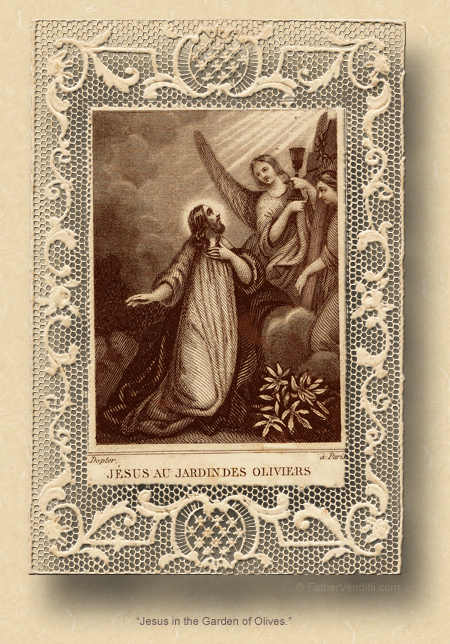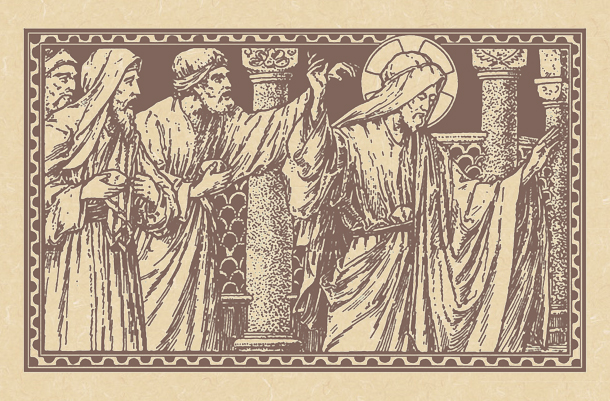Sticking to the Script.
The Sixth Thursday of Lent.*
Lessons from the feria, according to the ordinary form of the Roman Rite:
• Genesis 17: 3-9.
• Psalm 105: 4-9.
• John 8: 51-59.
Passion Thursday.
Lessons from the feria, according to the extraordinary form of the Roman Rite:
• Daniel 3: 25, 34-45.
• Psalm 95: 8-9.
• Luke 7: 36-50.
FatherVenditti.com
|
 7:01 AM 3/22/2018 — Today’s Gospel lesson picks up from yesterday’s in which our Lord is getting blow-back from His seminar on redemption, and the Jews attending this lecture continue their back and forth with Him about who is and who is not a true son of Abraham, after having failed to derail Him when they were arguing last week about who was a true son of Moses. It’s, in fact, paired with our first lesson from Genesis in which God makes His covenant with Abraham. But the most significant line in all the scriptures thrown at us today is the next to the last verse of our Gospel lesson, in which our Lord makes the declarative statement: “Amen, amen, I say to you, before Abraham came to be, I AM” (John 8: 58 RM3). 7:01 AM 3/22/2018 — Today’s Gospel lesson picks up from yesterday’s in which our Lord is getting blow-back from His seminar on redemption, and the Jews attending this lecture continue their back and forth with Him about who is and who is not a true son of Abraham, after having failed to derail Him when they were arguing last week about who was a true son of Moses. It’s, in fact, paired with our first lesson from Genesis in which God makes His covenant with Abraham. But the most significant line in all the scriptures thrown at us today is the next to the last verse of our Gospel lesson, in which our Lord makes the declarative statement: “Amen, amen, I say to you, before Abraham came to be, I AM” (John 8: 58 RM3).
We already saw, some days ago, how our Lord’s use of this prefix, “Amen, amen, I say to you…,” was a co-opting of a phrase used by God when speaking first to Abraham then to Moses, and He certainly knew that it would ruffle the feathers of the Jews with whom He’s debating. Today he not only doubles down, but actually ups the anti when He describes Himself using the very phrase with which God identified Himself to Moses from the burning bush: “I AM” (Exodus 3: 14). For the Jews, it’s the straw that broke the camel’s back, so to speak, as there can no longer be any doubt: Jesus has declared Himself to be God. And the Gospel lesson ends with them picking up stones to throw at Him.
We mentioned last Friday how our Lord wrestled with his disciples over whether to make this trip to Jerusalem. He, of course, doesn’t share with them the fact that He’s going there to die, but He has to be cagey with them in order to time His arrival precisely so that His death can occur at Passover time. Even if He had explained all this to them they wouldn’t have been capable of understanding it. But now, Passover is coming up, and Jesus has to ratchet things up a bit and speed them along, to make sure He dies just as the Sabbath is beginning at sundown on Friday; so, He drops this bomb on the Jews in the Temple to get the ball rolling. Now, having declared Himself God in their presence, He’s put into motion everything that needs to happen to make sure He dies at the proper time.
I mention this only because I suspect that, when we hear about our Lord weeping in the Garden on Good Friday, we walk away from that thinking that Jesus is simply weeping over something His Father is requiring of Him, as if He’s just passively obeying the Father. Jesus IS God, so when He’s praying to His Father in the Garden, He’s praying to Himself. Everything that’s happening here is happening because Jesus is causing it to happen, deliberately manipulating the various players in the drama to fulfill their respective roles.  It’s important, I think, to keep this in mind. Jesus isn’t an innocent victim in the sense that we routinely visualize that. God created man, God gave man free will, God watched in sorrow as man sinned, God determined the punishment of death that the sin required, and God came to earth as a man to then suffer that punishment for us. With the exception of man's betrayal, it's all according to plan. As he lay in the manger our Lord, as God, knew precisely how all of this was going to unfold. That’s why I don’t believe that Judas is in hell; he was created by God to do exactly what God intended for Him to do, and he did it exactly as required. Did our Lord not say to him in the Garden when Judas showed up and kissed Him, “Do what you have come to do”? We’ve wasted enough time already; mankind needs to be redeemed, so let’s get this over with. It’s important, I think, to keep this in mind. Jesus isn’t an innocent victim in the sense that we routinely visualize that. God created man, God gave man free will, God watched in sorrow as man sinned, God determined the punishment of death that the sin required, and God came to earth as a man to then suffer that punishment for us. With the exception of man's betrayal, it's all according to plan. As he lay in the manger our Lord, as God, knew precisely how all of this was going to unfold. That’s why I don’t believe that Judas is in hell; he was created by God to do exactly what God intended for Him to do, and he did it exactly as required. Did our Lord not say to him in the Garden when Judas showed up and kissed Him, “Do what you have come to do”? We’ve wasted enough time already; mankind needs to be redeemed, so let’s get this over with.
How we need to process this as individuals we’ll discuss in more detail in Saturday’s homily. What suffices for us today is to reflect on the fact that, in spite of us often thinking it’s so, we are not leaves blowing in the winds of fate. What God has mapped out for us as a people, He has also done for each one of us as individuals. And while we may not often sense His presence to us, His influence in the events of our lives, His constant loving concern for each one of us as individuals, it’s always there. We wouldn’t even be here were it not for the fact that God was continually willing our existence from moment to moment. The fact that we don’t “feel” Him there is our problem, not His. That’s where the virtue of Faith comes into play.
So, I’ll leave you to chew on that for a day or two. Then we can pick up these thoughts again on Saturday as we prepare to enter Holy Week.

* Because Lent began on a Wednesday, today is the sixth Thursday. Cf. the post here under the heading "Hey, aren't you off by a week?" for an explanation of how the days of the liturgical calendar are rendered on this site as opposed to how they are designated in the Roman Missal.
|

